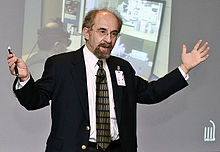Henry Fuchs: Difference between revisions
m remove invalid infobox param /ethnicity/ |
m Moving Category:1995 Fellows of the Association for Computing Machinery to Category:1995 fellows of the Association for Computing Machinery per Wikipedia:Categories for discussion/Speedy |
||
| (3 intermediate revisions by 3 users not shown) | |||
| Line 1: | Line 1: | ||
{{Short description| |
{{Short description|American computer graphics researcher (born 1948)}} |
||
{{other people}} |
{{other people}} |
||
{{Distinguish|Henry Fox (disambiguation)}} |
{{Distinguish|Henry Fox (disambiguation)}} |
||
| Line 59: | Line 59: | ||
[[Category:Computer graphics researchers]] |
[[Category:Computer graphics researchers]] |
||
[[Category:Fellows of the American Academy of Arts and Sciences]] |
[[Category:Fellows of the American Academy of Arts and Sciences]] |
||
[[Category: |
[[Category:1995 fellows of the Association for Computing Machinery]] |
||
[[Category:American people of Hungarian-Jewish descent]] |
[[Category:American people of Hungarian-Jewish descent]] |
||
[[Category:20th-century American Jews]] |
[[Category:20th-century American Jews]] |
||
Latest revision as of 07:15, 13 September 2024
Henry Fuchs | |
|---|---|
 Fuchs speaking at NASA Langley in 2009 | |
| Born | 20 January 1948 (age 76) Tokaj, Hungary |
| Citizenship | American |
| Alma mater | University of Utah |
| Awards | Fellow of the AAAS Fellow of the ACM Member of the NAE ACM SIGGRAPH Achievement Award Steven Anson Coons Award |
| Scientific career | |
| Fields | Computer scientist Biomedical engineer |
| Institutions | UNC UT Dallas |
| Doctoral advisor | Robert P. Plummer |

Henry Fuchs (born 20 January 1948 in Tokaj, Hungary) is a fellow of the American Academy of Arts and Sciences (AAAS) and the Association for Computing Machinery (ACM)[1] and the Federico Gil Professor of Computer Science at the University of North Carolina at Chapel Hill (UNC).[2] He is also an adjunct professor in biomedical engineering.
His research interests are in computer graphics, particularly rendering algorithms, hardware, virtual environments, telepresence systems, and applications in medicine.[3]
Fuchs was elected a member of the National Academy of Engineering in 1997 for contributions to computer graphics hardware and algorithms.
Career
[edit]Fuchs started his career as a programmer and consultant at the University of California at Santa Cruz, and as an engineer and consultant at the Image Processing Laboratory of NASA Jet Propulsion Laboratory in the California Institute of Technology. After the completion of his PhD in computer science in 1975 at the University of Utah, he became an adjunct associate professor of mathematical sciences and of medical computer science at the University of Texas at Dallas. In 1983 he became a professor of Computer Science at the University of North Carolina at Chapel Hill, and in 1988 he was promoted to the Federico Gil Distinguished Professor there, a position he still holds.
Awards and honours
[edit]In 1997 Fuchs became a member of the National Academy of Engineering (NAE).[3][4] In 1992, he received both the ACM SIGGRAPH Achievement Award and the Academic Award of the National Computer Graphics Association (NCGA),[1] and in 1997 he received the Satava Award of the Medicine Meets Virtual Reality Conference.[3] In 2013 he was honored with the IEEE-VGTC Virtual Reality Career Award,[5] and was awarded the Steven Anson Coons Award for Outstanding Creative Contributions to Computer Graphics in 2015. In 2018 Henry Fuchs received an Honorary Doctorate from TU Wien.[6]
References
[edit]- ^ a b "Faculty Honors: Henry Fuchs". UNC Department of Computer Science. Retrieved February 10, 2010.
- ^ "Faculty Biography: Henry Fuchs". UNC Department of Computer Science. Retrieved February 10, 2010.
- ^ a b c "Henry Fuchs Home Page". UNC Department of Computer Science. Retrieved February 10, 2010.
- ^ "NAE Website - Dr. Henry Fuchs". National Academy of Engineering. Retrieved June 6, 2013.
- ^ "IEEE-VR Website 2013". IEEE. Retrieved June 9, 2017.
- ^ "Honorary Doctorates of TU Wien". Archived from the original on 2017-10-20. Retrieved 2018-05-23.
External links
[edit] Media related to Henry Fuchs at Wikimedia Commons
Media related to Henry Fuchs at Wikimedia Commons- Henry Fuchs home page at the Department of Computer Science, University of North Carolina at Chapel Hill
- Henry Fuchs at DBLP Bibliography Server
- American computer scientists
- Computer graphics researchers
- Fellows of the American Academy of Arts and Sciences
- 1995 fellows of the Association for Computing Machinery
- American people of Hungarian-Jewish descent
- 20th-century American Jews
- Living people
- Members of the United States National Academy of Engineering
- University of North Carolina at Chapel Hill faculty
- University of Texas at Dallas faculty
- University of Utah alumni
- Virtual reality pioneers
- 1948 births
- 21st-century American Jews
- Computer specialist stubs
